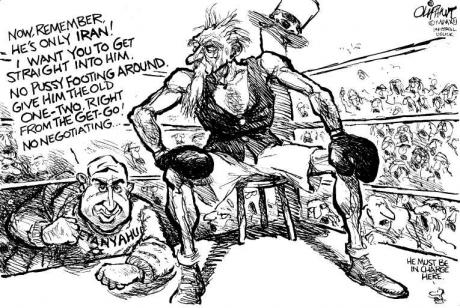
(The better informed everybody becomes the greater the chance that war can be prevented and propaganda can not distort reality. With a couple of clicks you can do your part by simply forwarding this to others.)
_______________________________________________________
(The talks seem to have gone okay, though no spin has yet been created out of Washington or Tel Aviv. Let’s see how their propaganda machine twists it. But the initial news is that things went reasonably well. Let’s hope they will meet again and get some concrete results soon.)
________________________________________________
Leave Us Out of Another Middle East War
By JAMES G. ABOUREZK
(James Abourezk is a former U.S. Senator from South Dakota.)
(It was a bit of surprise to read this Op-Ed in the Washington Post by Iran’s Foreign Minister. Mr. Ali Akbar Salehi is very articulate and actually has an excellent command of the English language, which has always been rare or non-existant with Iranian officials, especially those in negotiating positions. I am posting his entire Op-Ed because I think it should be read in its entiretly rather than just be highlighted.)
Forty-five years ago, the United States sold my country a research reactor as well as weapons-grade uranium as its fuel. Not long afterward, America agreed to help Iran set up the full nuclear fuel cycle along with atomic power plants. The U.S. argument was that nuclear power would provide for the growing needs of our economy and free our remaining oil reserves for export or conversion to petrochemicals.
That rationale has not changed.
Still, after the Islamic Revolution in our country in 1979, all understandings with the United States in the nuclear field unraveled. Washington even cut off fuel deliveries to the very facility it supplied. To secure fuel from other sources, Iran was forced to modify the reactor to run on uranium enriched to around 20 percent. The Tehran Research Reactor still operates, supplying isotopes used in the medical treatment of 800,000 of my fellow Iranians every year.
But getting to this point was not easy. In 2009, we put forward a request to the International Atomic Energy Agency for fuel for the reactor as its supply was running out, threatening the lives of many Iranians. When we agreed to exchange a major portion of our stock of low-enriched uranium for reactor fuel in 2010 — a proposal by the Obama administration — the response we got from the White House was a push for more U.N. Security Council sanctions.
Again, we did what every government is obliged to do: protect and ensure the well-being of our citizens. Thanks to the grace of God and the hard work of our committed and growing cadre of scientists, we managed to do something we had never done before: enrich uranium to the needed 20 percent and mold it into fuel plates for the reactor. We have never failed when faced with no option but to provide for our own needs.
All relationships — whether between parents and children, spouses or even nation-states — are based on trust. The example of the Tehran Research Reactor vividly illustrates the key issue between Iran and the United States: lack of trust.
We have strongly marked our opposition to weapons of mass destruction on many occasions. Almost seven years ago, Iranian Supreme Leader Ayatollah Ali Khamenei made a binding commitment. He issued a religious edict — a fatwa — forbidding the production, stockpiling and use of nuclear weapons. Our stance against weapons of mass destruction, which is far from new, has been put to the test. When Saddam Hussein attacked us with chemical arms in the 1980s, we did not retaliate with the same means. And when it comes to our nuclear energy program, the IAEA has failed to find any military dimension, despite an unprecedented number of man-hours in intrusive inspections.
Being sovereign and independent does not mean that there is no room for dialogue or diplomacy. It means that one enters any debate as an equal, based on mutual respect and justice. To reestablish trust, all sides must assume an honest approach with a view toward moving past the barriers to sincere dialogue.
A key aspect of entering a conversation based on mutual respect is recognizing the other side’s concerns as equal to one’s own. To solve the nuclear issue, the scope of the upcoming talks among Iran and the “P5+1” (the United States, Britain, China, France, Russia and Germany) must be comprehensive. The concerns of all sides must be addressed. Complex matters that have been left unaddressed for decades cannot be solved overnight. Another sign of mutual respect is a willingness and readiness to both give and take, without preconditions. This form of reciprocity is distinct from approaches that involve only taking. Most important, and this cannot be stressed enough, is that dialogue must be seen as a process rather than an event. A house can burn to the ground in minutes but takes a long time to build. Similarly, trust can easily and rapidly be broken, but it takes a long time to build.
If the intention of dialogue is merely to prevent cold conflict from turning hot, rather than to resolve differences, suspicion will linger. Trust will not be established. Despite sanctions, threats of war, assassinations of several of our scientists and other forms of terrorism, we have chosen to remain committed to dialogue.
In the upcoming talks, we hope that all sides will return to the negotiating table as equals with mutual respect; that all sides will be committed to comprehensive, long-term dialogue aimed at resolving all parties’ outstanding concerns; and, most important, that all sides make genuine efforts to reestablish confidence and trust.






